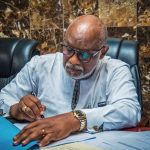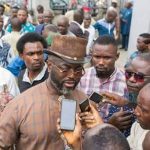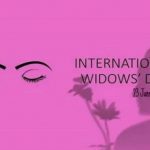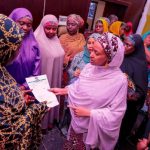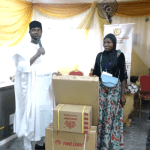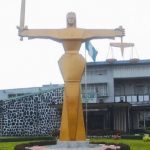A Dutch court said Wednesday it has jurisdiction to hear damages suit brought against Royal Dutch Shell by four widows of activists from Ogoniland in Rivers State who were executed by the then Nigerian military government in 1995.
In a preliminary decision, judges at the Hague District Court said they would allow the suit to go forward, a rare win in a decades-long legal fight, though the claimants must still prove Shell’s liability. Shell denies wrongdoing.
“This procedure will continue,” said presiding judge, Larissa Alwin, reading the decision of a three-judge panel.
The men executed were among a group that became known as the “Ogoni Nine” activists, who included writer and environmental rights activist, Dr. Ken Saro-Wiwa.
The group had protested Shell’s exploitation of the Niger Delta.
Its nine members were arrested and hanged after a flawed trial that turned international opinion against Nigeria’s then-military rulers.
A writ was placed before a civil court alleging that Shell was complicit “in the unlawful arrest, detention and execution of nine men who were hanged by Nigeria’s military government in the 1990s,” Amnesty International had said in a statement.
Saro-Wiwa, who was the president and founder of the Movement for the Survival of the Ogoni People (MOSOP), and eight others were executed on November 10, 1995, after a military tribunal convicted them of the murder of four traditional Ogoni chiefs.
The other eight were Saturday Dobee, Nordu Eawo, Daniel Gbooko, Paul Levera, Felix Nuate, Baribor Bera, Barinem Kiobel, and John Kpuine.
The four prominent chiefs whose killings led to the executions of the Ogoni nine were Edward Kobani; Albert Badey, a former Secretary to Rivers State Government; Theophilus Orage, and Sam Orage.
However, the execution of the nine activists provoked a global outcry and led to the suspension of Nigeria from the Commonwealth.
The country was re-admitted with the return of civil rule in 1999.
Alwin yesterday ordered Shell to turn over documents that could help the claimants’ case, specifically any evidence that Shell paid people to give false information about the activists to Nigerian law-enforcement officials.
“I am glad that the court has found it has jurisdiction,” lead plaintiff, Esther Kiobel, whose husband, Barinem Kiobel, was among those executed, said outside the courtroom.
“My husband was killed like a criminal. I want him to be exonerated.”
The relatives of the nine people have sought to hold Shell partially responsible in foreign courts, after exhausting legal possibilities in Nigeria.
Shell had paid $15.5 million to one group of activists’ families, including the Saro-Wiwa estate, in the United States in a 2009 settlement in which the company also denied any responsibility or wrongdoing.
A second group led by Kiobel fought on in the United States until the United States Supreme Court rejected jurisdiction in 2013.
Backed by Amnesty International, Kiobel and three other widows have continued legal action in Britain and the Netherlands.
“We’re not doing this to settle, we’re seeking to hold Shell to account,” Amnesty’s Mark Dummett said after the ruling, which he described as a “mixed decision”.
He said he was disappointed judges had rejected broader arguments that Shell was intertwined with the military government in power in Nigeria in 1995.
But he was pleased the court had accepted jurisdiction and disregarded Shell’s arguments that the case was too old to hear.
However, the judges rejected assertions by the widows that Shell should have done more to prevent their husbands’ executions.
“We continue to deny all the allegations in the strongest possible terms,” Shell’s representative and External Relations Manager of Shell Petroleum Development Company (SPDC), Mr. Igo Weli, said yesterday outside the court.
“Shell was not responsible for what happened. Shell actually made an appeal for clemency but sadly this was not heard,” Weli added.
No date has yet been set for a next hearing to submit additional evidence or a final decision.
The civil case has been brought by Esther Kiobel, the widow of Barinem Kiobel, who was hanged in 1995 along with Saro-Wiwa and seven others.
Shell was alleged to have helped in the arrest of the men, who had sought to disrupt oil development in the region, citing health and environmental impacts.
A Dutch court said Wednesday it has jurisdiction to hear damages suit brought against Royal Dutch Shell by four widows of activists from Ogoniland in Rivers State who were executed by the then Nigerian military government in 1995.
In a preliminary decision, judges at the Hague District Court said they would allow the suit to go forward, a rare win in a decades-long legal fight, though the claimants must still prove Shell’s liability. Shell denies wrongdoing.
“This procedure will continue,” said presiding judge, Larissa Alwin, reading the decision of a three-judge panel.
The men executed were among a group that became known as the “Ogoni Nine” activists, who included writer and environmental rights activist, Dr. Ken Saro-Wiwa.
The group had protested Shell’s exploitation of the Niger Delta.
Its nine members were arrested and hanged after a flawed trial that turned international opinion against Nigeria’s then-military rulers.
A writ was placed before a civil court alleging that Shell was complicit “in the unlawful arrest, detention and execution of nine men who were hanged by Nigeria’s military government in the 1990s,” Amnesty International had said in a statement.
Saro-Wiwa, who was the president and founder of the Movement for the Survival of the Ogoni People (MOSOP), and eight others were executed on November 10, 1995, after a military tribunal convicted them of the murder of four traditional Ogoni chiefs.
The other eight were Saturday Dobee, Nordu Eawo, Daniel Gbooko, Paul Levera, Felix Nuate, Baribor Bera, Barinem Kiobel, and John Kpuine.
The four prominent chiefs whose killings led to the executions of the Ogoni nine were Edward Kobani; Albert Badey, a former Secretary to Rivers State Government; Theophilus Orage, and Sam Orage.
However, the execution of the nine activists provoked a global outcry and led to the suspension of Nigeria from the Commonwealth.
The country was re-admitted with the return of civil rule in 1999.
Alwin yesterday ordered Shell to turn over documents that could help the claimants’ case, specifically any evidence that Shell paid people to give false information about the activists to Nigerian law-enforcement officials.
“I am glad that the court has found it has jurisdiction,” lead plaintiff, Esther Kiobel, whose husband, Barinem Kiobel, was among those executed, said outside the courtroom.
“My husband was killed like a criminal. I want him to be exonerated.”
The relatives of the nine people have sought to hold Shell partially responsible in foreign courts, after exhausting legal possibilities in Nigeria.
Shell had paid $15.5 million to one group of activists’ families, including the Saro-Wiwa estate, in the United States in a 2009 settlement in which the company also denied any responsibility or wrongdoing.
A second group led by Kiobel fought on in the United States until the United States Supreme Court rejected jurisdiction in 2013.
Backed by Amnesty International, Kiobel and three other widows have continued legal action in Britain and the Netherlands.
“We’re not doing this to settle, we’re seeking to hold Shell to account,” Amnesty’s Mark Dummett said after the ruling, which he described as a “mixed decision”.
He said he was disappointed judges had rejected broader arguments that Shell was intertwined with the military government in power in Nigeria in 1995.
But he was pleased the court had accepted jurisdiction and disregarded Shell’s arguments that the case was too old to hear.
However, the judges rejected assertions by the widows that Shell should have done more to prevent their husbands’ executions.
“We continue to deny all the allegations in the strongest possible terms,” Shell’s representative and External Relations Manager of Shell Petroleum Development Company (SPDC), Mr. Igo Weli, said yesterday outside the court.
“Shell was not responsible for what happened. Shell actually made an appeal for clemency but sadly this was not heard,” Weli added.
No date has yet been set for a next hearing to submit additional evidence or a final decision.
The civil case has been brought by Esther Kiobel, the widow of Barinem Kiobel, who was hanged in 1995 along with Saro-Wiwa and seven others.
Shell was alleged to have helped in the arrest of the men, who had sought to disrupt oil development in the region, citing health and environmental impacts.
A Dutch court said Wednesday it has jurisdiction to hear damages suit brought against Royal Dutch Shell by four widows of activists from Ogoniland in Rivers State who were executed by the then Nigerian military government in 1995.
In a preliminary decision, judges at the Hague District Court said they would allow the suit to go forward, a rare win in a decades-long legal fight, though the claimants must still prove Shell’s liability. Shell denies wrongdoing.
“This procedure will continue,” said presiding judge, Larissa Alwin, reading the decision of a three-judge panel.
The men executed were among a group that became known as the “Ogoni Nine” activists, who included writer and environmental rights activist, Dr. Ken Saro-Wiwa.
The group had protested Shell’s exploitation of the Niger Delta.
Its nine members were arrested and hanged after a flawed trial that turned international opinion against Nigeria’s then-military rulers.
A writ was placed before a civil court alleging that Shell was complicit “in the unlawful arrest, detention and execution of nine men who were hanged by Nigeria’s military government in the 1990s,” Amnesty International had said in a statement.
Saro-Wiwa, who was the president and founder of the Movement for the Survival of the Ogoni People (MOSOP), and eight others were executed on November 10, 1995, after a military tribunal convicted them of the murder of four traditional Ogoni chiefs.
The other eight were Saturday Dobee, Nordu Eawo, Daniel Gbooko, Paul Levera, Felix Nuate, Baribor Bera, Barinem Kiobel, and John Kpuine.
The four prominent chiefs whose killings led to the executions of the Ogoni nine were Edward Kobani; Albert Badey, a former Secretary to Rivers State Government; Theophilus Orage, and Sam Orage.
However, the execution of the nine activists provoked a global outcry and led to the suspension of Nigeria from the Commonwealth.
The country was re-admitted with the return of civil rule in 1999.
Alwin yesterday ordered Shell to turn over documents that could help the claimants’ case, specifically any evidence that Shell paid people to give false information about the activists to Nigerian law-enforcement officials.
“I am glad that the court has found it has jurisdiction,” lead plaintiff, Esther Kiobel, whose husband, Barinem Kiobel, was among those executed, said outside the courtroom.
“My husband was killed like a criminal. I want him to be exonerated.”
The relatives of the nine people have sought to hold Shell partially responsible in foreign courts, after exhausting legal possibilities in Nigeria.
Shell had paid $15.5 million to one group of activists’ families, including the Saro-Wiwa estate, in the United States in a 2009 settlement in which the company also denied any responsibility or wrongdoing.
A second group led by Kiobel fought on in the United States until the United States Supreme Court rejected jurisdiction in 2013.
Backed by Amnesty International, Kiobel and three other widows have continued legal action in Britain and the Netherlands.
“We’re not doing this to settle, we’re seeking to hold Shell to account,” Amnesty’s Mark Dummett said after the ruling, which he described as a “mixed decision”.
He said he was disappointed judges had rejected broader arguments that Shell was intertwined with the military government in power in Nigeria in 1995.
But he was pleased the court had accepted jurisdiction and disregarded Shell’s arguments that the case was too old to hear.
However, the judges rejected assertions by the widows that Shell should have done more to prevent their husbands’ executions.
“We continue to deny all the allegations in the strongest possible terms,” Shell’s representative and External Relations Manager of Shell Petroleum Development Company (SPDC), Mr. Igo Weli, said yesterday outside the court.
“Shell was not responsible for what happened. Shell actually made an appeal for clemency but sadly this was not heard,” Weli added.
No date has yet been set for a next hearing to submit additional evidence or a final decision.
The civil case has been brought by Esther Kiobel, the widow of Barinem Kiobel, who was hanged in 1995 along with Saro-Wiwa and seven others.
Shell was alleged to have helped in the arrest of the men, who had sought to disrupt oil development in the region, citing health and environmental impacts.
A Dutch court said Wednesday it has jurisdiction to hear damages suit brought against Royal Dutch Shell by four widows of activists from Ogoniland in Rivers State who were executed by the then Nigerian military government in 1995.
In a preliminary decision, judges at the Hague District Court said they would allow the suit to go forward, a rare win in a decades-long legal fight, though the claimants must still prove Shell’s liability. Shell denies wrongdoing.
“This procedure will continue,” said presiding judge, Larissa Alwin, reading the decision of a three-judge panel.
The men executed were among a group that became known as the “Ogoni Nine” activists, who included writer and environmental rights activist, Dr. Ken Saro-Wiwa.
The group had protested Shell’s exploitation of the Niger Delta.
Its nine members were arrested and hanged after a flawed trial that turned international opinion against Nigeria’s then-military rulers.
A writ was placed before a civil court alleging that Shell was complicit “in the unlawful arrest, detention and execution of nine men who were hanged by Nigeria’s military government in the 1990s,” Amnesty International had said in a statement.
Saro-Wiwa, who was the president and founder of the Movement for the Survival of the Ogoni People (MOSOP), and eight others were executed on November 10, 1995, after a military tribunal convicted them of the murder of four traditional Ogoni chiefs.
The other eight were Saturday Dobee, Nordu Eawo, Daniel Gbooko, Paul Levera, Felix Nuate, Baribor Bera, Barinem Kiobel, and John Kpuine.
The four prominent chiefs whose killings led to the executions of the Ogoni nine were Edward Kobani; Albert Badey, a former Secretary to Rivers State Government; Theophilus Orage, and Sam Orage.
However, the execution of the nine activists provoked a global outcry and led to the suspension of Nigeria from the Commonwealth.
The country was re-admitted with the return of civil rule in 1999.
Alwin yesterday ordered Shell to turn over documents that could help the claimants’ case, specifically any evidence that Shell paid people to give false information about the activists to Nigerian law-enforcement officials.
“I am glad that the court has found it has jurisdiction,” lead plaintiff, Esther Kiobel, whose husband, Barinem Kiobel, was among those executed, said outside the courtroom.
“My husband was killed like a criminal. I want him to be exonerated.”
The relatives of the nine people have sought to hold Shell partially responsible in foreign courts, after exhausting legal possibilities in Nigeria.
Shell had paid $15.5 million to one group of activists’ families, including the Saro-Wiwa estate, in the United States in a 2009 settlement in which the company also denied any responsibility or wrongdoing.
A second group led by Kiobel fought on in the United States until the United States Supreme Court rejected jurisdiction in 2013.
Backed by Amnesty International, Kiobel and three other widows have continued legal action in Britain and the Netherlands.
“We’re not doing this to settle, we’re seeking to hold Shell to account,” Amnesty’s Mark Dummett said after the ruling, which he described as a “mixed decision”.
He said he was disappointed judges had rejected broader arguments that Shell was intertwined with the military government in power in Nigeria in 1995.
But he was pleased the court had accepted jurisdiction and disregarded Shell’s arguments that the case was too old to hear.
However, the judges rejected assertions by the widows that Shell should have done more to prevent their husbands’ executions.
“We continue to deny all the allegations in the strongest possible terms,” Shell’s representative and External Relations Manager of Shell Petroleum Development Company (SPDC), Mr. Igo Weli, said yesterday outside the court.
“Shell was not responsible for what happened. Shell actually made an appeal for clemency but sadly this was not heard,” Weli added.
No date has yet been set for a next hearing to submit additional evidence or a final decision.
The civil case has been brought by Esther Kiobel, the widow of Barinem Kiobel, who was hanged in 1995 along with Saro-Wiwa and seven others.
Shell was alleged to have helped in the arrest of the men, who had sought to disrupt oil development in the region, citing health and environmental impacts.
A Dutch court said Wednesday it has jurisdiction to hear damages suit brought against Royal Dutch Shell by four widows of activists from Ogoniland in Rivers State who were executed by the then Nigerian military government in 1995.
In a preliminary decision, judges at the Hague District Court said they would allow the suit to go forward, a rare win in a decades-long legal fight, though the claimants must still prove Shell’s liability. Shell denies wrongdoing.
“This procedure will continue,” said presiding judge, Larissa Alwin, reading the decision of a three-judge panel.
The men executed were among a group that became known as the “Ogoni Nine” activists, who included writer and environmental rights activist, Dr. Ken Saro-Wiwa.
The group had protested Shell’s exploitation of the Niger Delta.
Its nine members were arrested and hanged after a flawed trial that turned international opinion against Nigeria’s then-military rulers.
A writ was placed before a civil court alleging that Shell was complicit “in the unlawful arrest, detention and execution of nine men who were hanged by Nigeria’s military government in the 1990s,” Amnesty International had said in a statement.
Saro-Wiwa, who was the president and founder of the Movement for the Survival of the Ogoni People (MOSOP), and eight others were executed on November 10, 1995, after a military tribunal convicted them of the murder of four traditional Ogoni chiefs.
The other eight were Saturday Dobee, Nordu Eawo, Daniel Gbooko, Paul Levera, Felix Nuate, Baribor Bera, Barinem Kiobel, and John Kpuine.
The four prominent chiefs whose killings led to the executions of the Ogoni nine were Edward Kobani; Albert Badey, a former Secretary to Rivers State Government; Theophilus Orage, and Sam Orage.
However, the execution of the nine activists provoked a global outcry and led to the suspension of Nigeria from the Commonwealth.
The country was re-admitted with the return of civil rule in 1999.
Alwin yesterday ordered Shell to turn over documents that could help the claimants’ case, specifically any evidence that Shell paid people to give false information about the activists to Nigerian law-enforcement officials.
“I am glad that the court has found it has jurisdiction,” lead plaintiff, Esther Kiobel, whose husband, Barinem Kiobel, was among those executed, said outside the courtroom.
“My husband was killed like a criminal. I want him to be exonerated.”
The relatives of the nine people have sought to hold Shell partially responsible in foreign courts, after exhausting legal possibilities in Nigeria.
Shell had paid $15.5 million to one group of activists’ families, including the Saro-Wiwa estate, in the United States in a 2009 settlement in which the company also denied any responsibility or wrongdoing.
A second group led by Kiobel fought on in the United States until the United States Supreme Court rejected jurisdiction in 2013.
Backed by Amnesty International, Kiobel and three other widows have continued legal action in Britain and the Netherlands.
“We’re not doing this to settle, we’re seeking to hold Shell to account,” Amnesty’s Mark Dummett said after the ruling, which he described as a “mixed decision”.
He said he was disappointed judges had rejected broader arguments that Shell was intertwined with the military government in power in Nigeria in 1995.
But he was pleased the court had accepted jurisdiction and disregarded Shell’s arguments that the case was too old to hear.
However, the judges rejected assertions by the widows that Shell should have done more to prevent their husbands’ executions.
“We continue to deny all the allegations in the strongest possible terms,” Shell’s representative and External Relations Manager of Shell Petroleum Development Company (SPDC), Mr. Igo Weli, said yesterday outside the court.
“Shell was not responsible for what happened. Shell actually made an appeal for clemency but sadly this was not heard,” Weli added.
No date has yet been set for a next hearing to submit additional evidence or a final decision.
The civil case has been brought by Esther Kiobel, the widow of Barinem Kiobel, who was hanged in 1995 along with Saro-Wiwa and seven others.
Shell was alleged to have helped in the arrest of the men, who had sought to disrupt oil development in the region, citing health and environmental impacts.
A Dutch court said Wednesday it has jurisdiction to hear damages suit brought against Royal Dutch Shell by four widows of activists from Ogoniland in Rivers State who were executed by the then Nigerian military government in 1995.
In a preliminary decision, judges at the Hague District Court said they would allow the suit to go forward, a rare win in a decades-long legal fight, though the claimants must still prove Shell’s liability. Shell denies wrongdoing.
“This procedure will continue,” said presiding judge, Larissa Alwin, reading the decision of a three-judge panel.
The men executed were among a group that became known as the “Ogoni Nine” activists, who included writer and environmental rights activist, Dr. Ken Saro-Wiwa.
The group had protested Shell’s exploitation of the Niger Delta.
Its nine members were arrested and hanged after a flawed trial that turned international opinion against Nigeria’s then-military rulers.
A writ was placed before a civil court alleging that Shell was complicit “in the unlawful arrest, detention and execution of nine men who were hanged by Nigeria’s military government in the 1990s,” Amnesty International had said in a statement.
Saro-Wiwa, who was the president and founder of the Movement for the Survival of the Ogoni People (MOSOP), and eight others were executed on November 10, 1995, after a military tribunal convicted them of the murder of four traditional Ogoni chiefs.
The other eight were Saturday Dobee, Nordu Eawo, Daniel Gbooko, Paul Levera, Felix Nuate, Baribor Bera, Barinem Kiobel, and John Kpuine.
The four prominent chiefs whose killings led to the executions of the Ogoni nine were Edward Kobani; Albert Badey, a former Secretary to Rivers State Government; Theophilus Orage, and Sam Orage.
However, the execution of the nine activists provoked a global outcry and led to the suspension of Nigeria from the Commonwealth.
The country was re-admitted with the return of civil rule in 1999.
Alwin yesterday ordered Shell to turn over documents that could help the claimants’ case, specifically any evidence that Shell paid people to give false information about the activists to Nigerian law-enforcement officials.
“I am glad that the court has found it has jurisdiction,” lead plaintiff, Esther Kiobel, whose husband, Barinem Kiobel, was among those executed, said outside the courtroom.
“My husband was killed like a criminal. I want him to be exonerated.”
The relatives of the nine people have sought to hold Shell partially responsible in foreign courts, after exhausting legal possibilities in Nigeria.
Shell had paid $15.5 million to one group of activists’ families, including the Saro-Wiwa estate, in the United States in a 2009 settlement in which the company also denied any responsibility or wrongdoing.
A second group led by Kiobel fought on in the United States until the United States Supreme Court rejected jurisdiction in 2013.
Backed by Amnesty International, Kiobel and three other widows have continued legal action in Britain and the Netherlands.
“We’re not doing this to settle, we’re seeking to hold Shell to account,” Amnesty’s Mark Dummett said after the ruling, which he described as a “mixed decision”.
He said he was disappointed judges had rejected broader arguments that Shell was intertwined with the military government in power in Nigeria in 1995.
But he was pleased the court had accepted jurisdiction and disregarded Shell’s arguments that the case was too old to hear.
However, the judges rejected assertions by the widows that Shell should have done more to prevent their husbands’ executions.
“We continue to deny all the allegations in the strongest possible terms,” Shell’s representative and External Relations Manager of Shell Petroleum Development Company (SPDC), Mr. Igo Weli, said yesterday outside the court.
“Shell was not responsible for what happened. Shell actually made an appeal for clemency but sadly this was not heard,” Weli added.
No date has yet been set for a next hearing to submit additional evidence or a final decision.
The civil case has been brought by Esther Kiobel, the widow of Barinem Kiobel, who was hanged in 1995 along with Saro-Wiwa and seven others.
Shell was alleged to have helped in the arrest of the men, who had sought to disrupt oil development in the region, citing health and environmental impacts.
A Dutch court said Wednesday it has jurisdiction to hear damages suit brought against Royal Dutch Shell by four widows of activists from Ogoniland in Rivers State who were executed by the then Nigerian military government in 1995.
In a preliminary decision, judges at the Hague District Court said they would allow the suit to go forward, a rare win in a decades-long legal fight, though the claimants must still prove Shell’s liability. Shell denies wrongdoing.
“This procedure will continue,” said presiding judge, Larissa Alwin, reading the decision of a three-judge panel.
The men executed were among a group that became known as the “Ogoni Nine” activists, who included writer and environmental rights activist, Dr. Ken Saro-Wiwa.
The group had protested Shell’s exploitation of the Niger Delta.
Its nine members were arrested and hanged after a flawed trial that turned international opinion against Nigeria’s then-military rulers.
A writ was placed before a civil court alleging that Shell was complicit “in the unlawful arrest, detention and execution of nine men who were hanged by Nigeria’s military government in the 1990s,” Amnesty International had said in a statement.
Saro-Wiwa, who was the president and founder of the Movement for the Survival of the Ogoni People (MOSOP), and eight others were executed on November 10, 1995, after a military tribunal convicted them of the murder of four traditional Ogoni chiefs.
The other eight were Saturday Dobee, Nordu Eawo, Daniel Gbooko, Paul Levera, Felix Nuate, Baribor Bera, Barinem Kiobel, and John Kpuine.
The four prominent chiefs whose killings led to the executions of the Ogoni nine were Edward Kobani; Albert Badey, a former Secretary to Rivers State Government; Theophilus Orage, and Sam Orage.
However, the execution of the nine activists provoked a global outcry and led to the suspension of Nigeria from the Commonwealth.
The country was re-admitted with the return of civil rule in 1999.
Alwin yesterday ordered Shell to turn over documents that could help the claimants’ case, specifically any evidence that Shell paid people to give false information about the activists to Nigerian law-enforcement officials.
“I am glad that the court has found it has jurisdiction,” lead plaintiff, Esther Kiobel, whose husband, Barinem Kiobel, was among those executed, said outside the courtroom.
“My husband was killed like a criminal. I want him to be exonerated.”
The relatives of the nine people have sought to hold Shell partially responsible in foreign courts, after exhausting legal possibilities in Nigeria.
Shell had paid $15.5 million to one group of activists’ families, including the Saro-Wiwa estate, in the United States in a 2009 settlement in which the company also denied any responsibility or wrongdoing.
A second group led by Kiobel fought on in the United States until the United States Supreme Court rejected jurisdiction in 2013.
Backed by Amnesty International, Kiobel and three other widows have continued legal action in Britain and the Netherlands.
“We’re not doing this to settle, we’re seeking to hold Shell to account,” Amnesty’s Mark Dummett said after the ruling, which he described as a “mixed decision”.
He said he was disappointed judges had rejected broader arguments that Shell was intertwined with the military government in power in Nigeria in 1995.
But he was pleased the court had accepted jurisdiction and disregarded Shell’s arguments that the case was too old to hear.
However, the judges rejected assertions by the widows that Shell should have done more to prevent their husbands’ executions.
“We continue to deny all the allegations in the strongest possible terms,” Shell’s representative and External Relations Manager of Shell Petroleum Development Company (SPDC), Mr. Igo Weli, said yesterday outside the court.
“Shell was not responsible for what happened. Shell actually made an appeal for clemency but sadly this was not heard,” Weli added.
No date has yet been set for a next hearing to submit additional evidence or a final decision.
The civil case has been brought by Esther Kiobel, the widow of Barinem Kiobel, who was hanged in 1995 along with Saro-Wiwa and seven others.
Shell was alleged to have helped in the arrest of the men, who had sought to disrupt oil development in the region, citing health and environmental impacts.
A Dutch court said Wednesday it has jurisdiction to hear damages suit brought against Royal Dutch Shell by four widows of activists from Ogoniland in Rivers State who were executed by the then Nigerian military government in 1995.
In a preliminary decision, judges at the Hague District Court said they would allow the suit to go forward, a rare win in a decades-long legal fight, though the claimants must still prove Shell’s liability. Shell denies wrongdoing.
“This procedure will continue,” said presiding judge, Larissa Alwin, reading the decision of a three-judge panel.
The men executed were among a group that became known as the “Ogoni Nine” activists, who included writer and environmental rights activist, Dr. Ken Saro-Wiwa.
The group had protested Shell’s exploitation of the Niger Delta.
Its nine members were arrested and hanged after a flawed trial that turned international opinion against Nigeria’s then-military rulers.
A writ was placed before a civil court alleging that Shell was complicit “in the unlawful arrest, detention and execution of nine men who were hanged by Nigeria’s military government in the 1990s,” Amnesty International had said in a statement.
Saro-Wiwa, who was the president and founder of the Movement for the Survival of the Ogoni People (MOSOP), and eight others were executed on November 10, 1995, after a military tribunal convicted them of the murder of four traditional Ogoni chiefs.
The other eight were Saturday Dobee, Nordu Eawo, Daniel Gbooko, Paul Levera, Felix Nuate, Baribor Bera, Barinem Kiobel, and John Kpuine.
The four prominent chiefs whose killings led to the executions of the Ogoni nine were Edward Kobani; Albert Badey, a former Secretary to Rivers State Government; Theophilus Orage, and Sam Orage.
However, the execution of the nine activists provoked a global outcry and led to the suspension of Nigeria from the Commonwealth.
The country was re-admitted with the return of civil rule in 1999.
Alwin yesterday ordered Shell to turn over documents that could help the claimants’ case, specifically any evidence that Shell paid people to give false information about the activists to Nigerian law-enforcement officials.
“I am glad that the court has found it has jurisdiction,” lead plaintiff, Esther Kiobel, whose husband, Barinem Kiobel, was among those executed, said outside the courtroom.
“My husband was killed like a criminal. I want him to be exonerated.”
The relatives of the nine people have sought to hold Shell partially responsible in foreign courts, after exhausting legal possibilities in Nigeria.
Shell had paid $15.5 million to one group of activists’ families, including the Saro-Wiwa estate, in the United States in a 2009 settlement in which the company also denied any responsibility or wrongdoing.
A second group led by Kiobel fought on in the United States until the United States Supreme Court rejected jurisdiction in 2013.
Backed by Amnesty International, Kiobel and three other widows have continued legal action in Britain and the Netherlands.
“We’re not doing this to settle, we’re seeking to hold Shell to account,” Amnesty’s Mark Dummett said after the ruling, which he described as a “mixed decision”.
He said he was disappointed judges had rejected broader arguments that Shell was intertwined with the military government in power in Nigeria in 1995.
But he was pleased the court had accepted jurisdiction and disregarded Shell’s arguments that the case was too old to hear.
However, the judges rejected assertions by the widows that Shell should have done more to prevent their husbands’ executions.
“We continue to deny all the allegations in the strongest possible terms,” Shell’s representative and External Relations Manager of Shell Petroleum Development Company (SPDC), Mr. Igo Weli, said yesterday outside the court.
“Shell was not responsible for what happened. Shell actually made an appeal for clemency but sadly this was not heard,” Weli added.
No date has yet been set for a next hearing to submit additional evidence or a final decision.
The civil case has been brought by Esther Kiobel, the widow of Barinem Kiobel, who was hanged in 1995 along with Saro-Wiwa and seven others.
Shell was alleged to have helped in the arrest of the men, who had sought to disrupt oil development in the region, citing health and environmental impacts.



